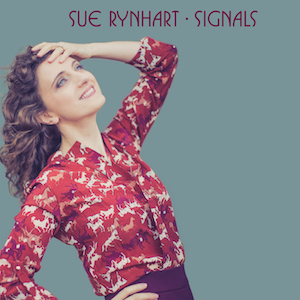 Sue Rynhart – Signals
Sue Rynhart – Signals
mrsuesue Records – 2017
Sue Rynhart’s a Dublin singer and song composer who draws principally on classical and jazz traditions for her musical inspiration. She communicates her artistic vision in her songs with precision and immediacy, combining grace and energy while deliberately placing her voice within the context of sparsely scored, emotion-baring musical settings.
Signals is Sue Rynhart’s second album of original songs, and it’s a truly extraordinary experience, which the over-used stock phrases “unique” and “independently quirky” would significantly undersell. Everywhere, musical and literary boundaries are creatively blurred, yet the result is always precisely expressive. On its predecessor Crossings (2014), Sue’s voice was set against nothing more than the stark yet full-toned, artfully responsive double bass of Dan Bodwell, and Dan also appears on Signals. But it’s also one of those albums where every track is different, literally, whether in the deployment of bare instrumental resources or in tempo, mood or inflexion.
Compassion, the new album’s lead track, deploys only Sue’s a cappella vocal, gorgeously layered, initially wordless then laconically voicing her own enigmatic poetry. It could almost be described as avant-garde, but without the barrier of unlistenability that label normally implies. Sure, other singers, from Laurie Anderson and Björk through to Ange Hardy (to name but three), have been experimenting with vocal layering techniques, but each in her own strikingly individual way and with a personal expressive goal. Here Sue’s interest is, I suspect, as much in the sensuality of the sound as in the meaning of the words sung; and interestingly, the quality of sensuality is revealed as much through the careful precision of Sue’s voice as in its physical properties. The second song on the album, Be Content, is introduced by, and propelled along on, Dan’s busily syncopated double bass, with the jazz idiom informing Sue’s delivery – at first scattish, subsequently delicately pointing the meaning from the lyric.
The next song, Foxed, is almost cinematic (in a serious-cartoon sense), wherein the stealthily animated double bass personifies said animal every bit as much as Sue Rynhart’s beguilingly sinuous vocal (both in word and line) that it shadows. Track 4, The Tree, is certainly the strangest of the disc’s musical experiences; it opens with a scary whispered section, which gives way to an eerily pure sung vocal line with discordant overtones, later poised airily above an insistent groaning double bass drone, finally playing out on a seemingly inconclusive twittery recorder coda (depicting restless birds perched in the higher branches?). The Coldest Month finds the double bass treading carefully on the ice of the studio floor, above which Sue sings a frostily folky melody. Perhaps it’s something of a companion piece to the next song, Black As The Crow Flies, a bold creation where the bowed bass stalks the night sky below Sue’s uneasy twinkly wordscape full of sinister imagery that finally yields to a frenzied bebop jubilation.
Then it’s back to Sue a cappella for the beautifully evocative ringing cadences that voice the playfully succulent supplications of Summer Bell, followed by the (here unusual) sound of a lute (guest musician Francesco Turrisi) to accompany Sue’s anguished troubadour reflections on Silliest Game – probably the most conventionally art-song-influenced of all the disc’s songs. An aching double bass arco undertow both characterises and permeates the queasy stasis of In Between, where Sue attains an uncomfortable higher-pitched potency punctuated by stabbing mbira ostinato. Little Sparrow returns a pointed delicacy of expression above Dan’s birdlike tripping bass footsteps. Sue’s florid, angular In Dulci Jubilo edgily rejoices to the timeless thud beat of a medieval drum (Francesco again) before massed choral harmonies join Sue in the concluding mantra. The final track – Wall, Wall, Another Wall – sets an impenetrable spoken text against a slower-paced vocal chant, with each element shifting in and out of focus as in a half-experienced dream; though I’ll admit that the sense/meaning/logic of just this one track has eluded me even after many plays of the whole album. Here, more than anywhere else, I really wish I had the lyrics to hand to get to understand just what’s going on in there. Even so, Sue’s atmospheric lyrics would all I suspect make fantastic reading as poetry even outside of their prime, intended musical context.
The disc is impeccably recorded, with the intense natural resonances of the double bass, in particular, being brilliantly caught while maintaining a credible perspective with the deft expressiveness and tender cadences of Sue’s voice.
Not wishing in any way to denigrate Sue Rynhart’s achievement by merely peddling cliché, but I’ll stick my neck out and say that Signals really is one of the most exciting, rewarding and stimulating albums I’ve heard so far this year.
Signals is Out Now
Connect with Sue Rynhart here:

